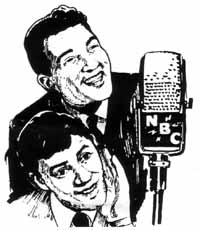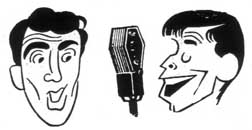|

This story was published in Radio Recall, the journal of the Metropolitan Washington Old-Time Radio Club, published six times per year.
Click here to return to the index of selected articles.
|
|

Part Two: The 1951-53 Series
(Continued from last issue)
by Michael Hayde © 2003
By the summer of 1951, Dean Martin and Jerry Lewis were ready to try another radio series. In the months since The Martin and Lewis Show had ended, they had become the hottest act in show business. They were the nation’s number one movie attraction, made personal appearance tours of theatres and auditoriums that smashed box office records, and walked away with sixty-two million TV viewers every Sunday night they appeared on The Colgate Comedy Hour.
They hadn’t completely ignored radio - they appeared twice on The Big Show, where they disrupted rehearsals and infuriated Tallulah Bankhead by insisting that she, quote, "wash up, collect your money, and get out!" - but it was The Colgate Comedy Hour that got most of the attention.
The Comedy Hour used alternating hosts - others included radio veterans Eddie Cantor, Abbott & Costello, Fred Allen, as well as up-and-comers like Jackie Gleason and Phil Silvers. During the 1950-51 season, Martin and Lewis hosted eight times and guest starred on Silvers’ first show. That used up a lot of material, so Dean and Jerry renegotiated their contract so they’d only have to do five appearances for the following season.
However, audiences were demanding more Martin & Lewis, not less... so NBC offered another weekly half-hour radio series, sweetening the deal by paying the team ten thousand dollars a week to do it.
For that kind of money, NBC was not about to repeat the mistakes of the earlier effort. In fact, the only thing this new show had in common with the old was that it was transcribed. The network jettisoned the situation comedy format in favor of straight variety, similar to the show Bing Crosby was doing over at CBS.
During the course of the thirty minutes, Dean would serve as Master of Ceremonies and, like Bing, would sing three songs. He and Jerry would engage in some verbal horseplay during the first half; for the second, they’d bring on the guest star and perform with him or he in a sketch. The sketch portion was usually a movie satire, although occasionally they would skewer popular songs or other radio programs.
Wisely, the network hired Martin and Lewis’s own writers, the two men who made them shine on the Comedy Hour: Ed Simmons and Norman Lear. Dick Mack would serve as producer/director.
| . There was no question that there would be sponsors. NBC offered the show as part of their "Operation: Tandem" experiment - a series of shows sponsored by multiple products. Chester-field cigarettes and Anacin tablets, who had jointly sponsored one-third of The Big Show the previous season, signed on and were joined four weeks later by American Chicle, the makers of Dentyne and Chiclets gum. |

Illustrations by Bobb Lynes
|
The Dean Martin and Jerry Lewis Show debuted on Friday, October 5th, 1951 at 8:30pm. The announcer was Jimmy Wallington (who also announced The Big Show ), and the first guest was Dinah Shore, who fought valiantly but vainly to refrain from laughing during the sketch - a parody of "A Streetcar Named Desire" titled "A Streetcar Named Max."
VARIETY called this premiere "one of the most hilarious 30 minutes in radio," but admitted that this was at least partly due to the fact that "the ’sound only’ Martin & Lewis presentation permits for a visualization of their antics - the listener can fill in the rest." On the negative side, a critic for TV-RADIO LIFE magazine wrote: "As much as we like the zany pair on television, let’s face it: they are not audio artists. We suggest they try a situation-comedy script to help keep their ebullient enthusiasm in check." (Talk about a short memory!)
In fact, The Dean Martin and Jerry Lewis Show occasionally resembled an audio tape version of The Colgate Comedy Hour. Simmons and Lear recycled jokes, running gags, and sometimes entire sketches between the two programs. And while the radio audience wasn’t as big as the one for TV, enough listeners tuned in to make NBC happy. Readers of RADIO-TV MIRROR voted The Dean Martin and Jerry Lewis Show "favorite comedy show" on radio for 1951-52, and the team was presented with this honor on the broadcast of April 11, 1952. All told, 30 programs were transcribed during this first season and all are in circulation.
The series resumed in the fall of ‘52, moving to Tuesday nights at 9:00pm. Chesterfield became the sole sponsor, and they brought in their own announcer, George Fenneman. If anything, the show became more surreal - jokes concerning Jerry’s relationship with Dean were as subtle as a smack in the mouth: DEAN: "So why haven’t you gotten married?" JERRY: "You haven’t asked me, bubby!" Even Fenneman can be heard spoofing himself. During a parody of *You Bet Your Life*, on the broadcast of October 14, "Groucho Martin" asks Fenneman to remind listeners about how "the other couple" is doing. Fenneman complies: "The sponsor and the sponsor’s wife are way ahead with eighteen million dollars."
With the broadcast of December 9, Simmons and Lear departed and were replaced with Arthur Phillips and Austin "Rocky" Kalish - who, like their predecessors, were discovered and hired by Jerry. The two new writers didn’t make any radical changes to the format - although the closing sketches began drifting away from satire of specific radio shows and movies toward original plays, such as the one on the program of February 24, 1953 (which featured Marilyn Monroe): "Tonight’s play is the story of a cold-blooded newspaper editor who has no friends, but who is loved by Marilyn Monroe - entitled, ‘So Who Needs Friends?’"
The second season consisted of 43 broadcasts. As of this writing, 20 are in general circulation and another 11 are available at the Library of Congress.
The Dean Martin and Jerry Lewis Show did not return to NBC radio after the summer hiatus in 1953, despite assurances from the boys, during their final show of July 14, that they would be back in two months. Certainly by this time, radio was losing the battle with television, so NBC may have decided the show was too expensive to keep around. It never drew the same numbers as The Colgate Comedy Hour, so it’s possible that Chesterfield lost interest and nobody else wanted it. It’s a cinch that Jerry Lewis lost interest - he knew well that he was funnier when seen.
Today, Jerry says that Dean hated doing radio more than he did, but that’s questionable. For one thing, it presented Martin with an excellent opportunity to plug his latest records, given that he sang three songs per half-hour every week, as opposed to two songs every two months on the Comedy Hour.
For another, it required almost no effort or rehearsal on his part - which exactly mirrored his lifetime work ethic. Since Jerry made the business decisions, he may well have told NBC that Martin & Lewis would stick to television. If he did, it may have added a little more fuel to the fire that would eventually consume their friendship and their act, in that order.
| The break up was a gradual, painful process brought on by conflicting ambitions. Dean was tired of being cast in films where he played a heel for all but the final ten minutes. Jerry wanted to make his character more sympathetic to audiences - which meant that Dean would have to provide conflict by playing the heel. |
 |
In addition to the movies, Lewis began using this modus operandi in their Colgate Comedy Hour sketches. Martin - never one to put his feelings on the table - would harbor a growing resentment until he finally blew up over something trivial; or else he’d strike back by not showing up at a premiere or benefit performance, leaving Lewis to go solo. As for Jerry: you only had to cross him once to earn his enmity for a lifetime. By 1956, after long periods of not speaking except on stage, both men decided that enough was enough. Martin and Lewis split up for good ten years to the day after forming their partnership.
Today, assessing the unprecedented popularity of Martin & Lewis is difficult, which may explain why, despite a great deal of hype, last year’s TV movie about them only ranked #31 for the week it aired. Fortunately, the best of their radio work helps provide an answer. The team’s movies - the one aspect of their career that was intended for posterity - are fairly conventional 1950’s comedies.
Occasionally you get a glimpse of their stage personas, but there’s none of the freewheeling anarchy that infused their live performances. And while their early television work shows the team at the top of its game and provides the best example of what they were like on stage, their radio shows - especially the second series - can better demonstrate their comedic style than most of their films. For that reason, they are highly recommended.
|